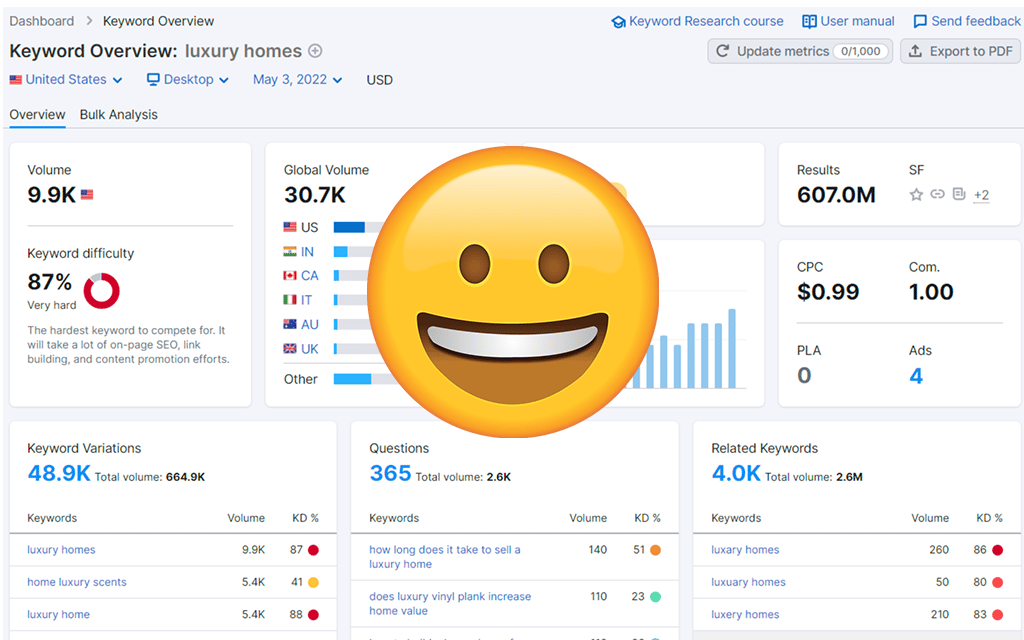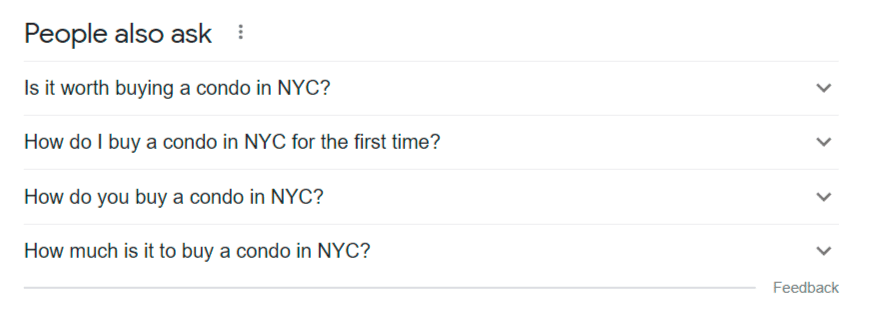Having trouble finding real estate keywords that actually drive qualified leads to your blog posts and YouTube videos? Don’t worry, you’re not alone. Choosing keywords for your agent website is hard if you don’t know what you’re doing.
That’s why we decided to put together this guide with 117 real estate keywords that buyers and sellers commonly search for. Perhaps more importantly, we’ll show you tools to find more keywords and show you how to customize and use these keywords in your blog posts and YouTube videos.
What Are Real Estate Keywords?
Real estate keywords are words or short phrases that Google and other search engines use to categorize content. Generally speaking, the real estate keywords used in an article will represent the main subject of a blog post or webpage.
Over the last few years, Google’s algorithm has gotten smarter. Much smarter. Today Google uses advanced artificial intelligence (AI) to deliver hyper-specific answers to the questions people search for. Increasingly, those answers are targeted to the searcher’s geographic location. This is why tailoring your keywords to specific local audiences is crucial.
Before you dive in, you should understand that keywords are only one element of an effective search engine optimization (SEO) strategy. If you’re brand-new to SEO, check out our in-depth guide here:
The Ultimate Real Estate SEO Guide: 10 Steps to Better Ranking
The Best Real Estate Keywords
Here is our list of the best real estate keywords. You can use these keywords to plan which articles to write for your blog. Always remember that your main goal here is to educate your reader first and show up on Google second. In fact, if your article is spammy or overstuffed with keywords, it won’t rank on Google for long.
We included both short-tail keywords (single words and phrases) and long-tail keywords (short sentences and questions) in this list. Generally speaking, long-tail keywords will have a smaller audience searching for them, but their specificity makes them more relevant. Most of the SEO content you create should use long-tail keywords, which are generally more critical than short-tail keywords.
| Realtor | Best neighborhoods | How accurate are Zillow estimates? | Buying vs building a house | Real estate housing market |
| How to find a Realtor | Closing costs | How to buy a house with no money | Do open houses work? | Real estate photography |
| Best Realtor | Who pays closing costs? | Best time to sell a house | What to look for when buying a house | Home prices |
| Should I hire a Realtor? | Closing costs for seller | Best time to buy a house | FHA loans | How to invest in real estate |
| How to choose a Realtor | How to sell your house without a Realtor | Staging a house | FHA vs conventional loans | New homes for sale |
| Is it a good time to buy a house? | How much does it cost to sell a house? | Curb appeal | How to get preapproved for a home loan | Homes for sale near me |
| How much is my house worth? | How long does it take to sell a house? | Curb appeal ideas | How to add a room to a house cheap | Real estate agent near me |
| Renting vs buying a house | First-time homebuyer programs | Curb appeal landscaping | What do appraisers look for? | Open houses near me |
| Homeselling tips | Sell my house | Buying a foreclosed home | Best home improvements to increase value | Properties for sale near me |
| Homebuying tips | Sell my house fast | What makes buying a foreclosed property risky? | Buying a duplex | Foreclosed homes near me |
| How to sell a house by owner | Best neighborhoods | What not to fix when selling a house | Buying a vacation home | Land for sale near me |
| For sale by owner | Home inspection checklist | How much do you lose selling a house as is? | 1031 exchange real estate | Zillow home value |
| How to buy a house | Home inspection checklist for sellers | Home inspection checklist | Housing bubble | Zillow Zestimate |
| Condos for sale | Home inspection checklist for buyers | What is the best way to prepare for an inspection? | Will home prices ever go down? | Zillow homes for sale |
| Duplexes for sale | Homebuying checklist | What do home inspectors look for? | How to rent your house | Homes for sale by owner |
| Townhomes for sale | Homeselling checklist | How to win a bidding war on a house | Short sale process | MLS listings |
| Cheap houses for sale | Final walk-through checklist | How to make an offer on a house | Who pays Realtor fees? | Buying a house |
| Waterfront homes for sale | Home estimate | How much over asking price should I offer on a home? | How to buy a home | Sell my house fast |
| New constructions homes | Home valuation | Buying a house in a seller's market | Steps to buy a house | How to sell a haunted house |
| Multi-family homes for sale | What credit score is needed to buy a house? | How often do contingent offers fall through? | Process to buying a house | Buy my house |
| Real estate attorney | First-time buyer loan | Should I buy a house now or wait? | Is it a bad time to buy a house? | Home sale calculator |
| Sell house for cash | First-time homebuyer programs | How long does it take to sell a house? | Sell house fast | Down payment assistance programs |
| Home sale proceeds calculator | Capital gains on selling a house | Is now a good time to sell a house? | First-time homebuying | Is it a good time to buy a house? |
| Best time to sell a house | Home sale taxes |
Keywords for Your Farm Area
It is much easier to get your content to rank for local real estate keywords since there is much less competition. For example, tens of thousands of people might search for “closing costs,” but only a few hundred might search for “closing costs in Phoenix.” So whenever you are planning an article or video, make sure you come up with local long-tail keywords to answer questions for a specific audience in a specific location.
For example, let’s say the keyword is “how to buy a home.” In order to tailor this to your geographic area, you might change it to “how to buy a home in Charlotte.” Or you can make it even more specific, if there’s search volume, and focus on a neighborhood.
📌 Pro Tip
The idea here is to use keywords naturally in your articles. For every 100 words, you should use the keyword one time in the body copy, which gives you 1% keyword density. As long as you have the keyword in the title, meta, and H2s, don’t worry about how many times you use it in the body copy. Just use it whenever it feels natural.
How to Find Your Own Real Estate Keywords
As noted above, while our list of real estate keywords is a great starting point for your content, you will likely need to pinpoint more specific keywords to reach buyers and sellers in your farm area. In order to make your life easier, here are three ways to determine important keywords for your content.
1. Use SEO Tools to Find More Keywords
The best and most accurate way to find new keywords is to use dedicated SEO tools. These tools analyze millions of search engine results pages (SERP) to estimate important data like how many people search for a keyword per month (also called search volume), and crucially, how hard it is to rank for that keyword (difficulty). They also help analyze your competitors’ websites to see which keywords they’re ranking for. Here are three of our favorite SEO tools:
Ahrefs
-
Best for: Finding keyword search volume and difficulty
-
Cost: Starting at $99 per month
-
Ease of use: Medium
Our first go-to tool for keyword research is Ahrefs. Ahrefs has very similar tools that competitors like Moz offer, but its data is a bit more accurate (according to our own research, that is). It also gives you questions people ask along with keywords.
Moz
-
Best for: Competitor and keyword research
-
Cost: Starting at $99 per month ($79 per month paid annually)
-
Ease of use: Medium
One of the earliest SEO tools, Moz actually invented its own domain authority metric, which is widely used in the industry. You can use Moz to find what other sites are ranking for, as well as who is linking to them. And finally, we’re big fans of their learning center, which has resources for professionals at every stage of their SEO journey.
Semrush
-
Best for: Competitive research
-
Cost: Starting at $130 per month
-
Ease of use: Medium
Semrush is the go-to tool in the SEO industry for analyzing your competitors’ websites to see and track what keywords they rank for as well as getting lists of other sites that link to your competitor’s site. You can even set alerts, audit websites, and more.
2. Hire a Freelance Keyword Researcher on Fiverr
-
Best for: Outsourcing
-
Cost for keyword research: $5 to $150
By hiring someone on Fiverr to do your keyword research for you, you can get a simple spreadsheet of keywords and article ideas that will give you a road map for the year for less than the price of a month of SEO software.
Click below to head over to Fiverr and find someone to do your keyword research starting at just five bucks.
3. Research SERPs for Your Keywords
-
Best for: DIYers
-
Cost: Free
Another great (and free!) way to find keywords for your content is to research search engine results pages (SERPs). Try searching for common real estate terms in your area and see what results you get.
Google’s “People Also Ask” sections can be a gold mine of article or video ideas. For example, here is the “People Also Ask” section on the SERP for “How to buy a NYC condo”:
How to Use Keywords to Generate Traffic & Leads
There are two basic steps to using keywords effectively to generate traffic and leads. First, you need to tailor your real estate keywords to target local buyers and sellers. After all, ranking number one for “luxury homes” won’t be as helpful for your business if you can’t target people actually buying luxury homes in your farm area.
Second, you need to write blog posts or create videos that provide the best answer to the questions local buyers and sellers are searching for on Google. Here’s a quick breakdown of this process:
Determine Search Intent
Once you have a list of local long-tail keywords, the next step is to figure out which questions your local buyers and sellers want answered when they search Google for them. This is known as search intent and should be the driving force behind all content you create in order to rank on Google.
Think of it like Jeopardy: If your keyword is “homebuying tips for Phoenix,” the question being asked is pretty straightforward: “What do I need to know about buying a home in Phoenix?” However, if your keyword is something like “closing costs in Phoenix,” your local buyers and sellers will likely have more than one question.
- How much are closing costs in Phoenix?
- Who pays closing costs in Phoenix?
- How can I save money on closing costs in Phoenix?
Write Blog Posts or Create Videos to Answer Questions Local Buyers & Sellers Are Asking
OK, now that you have a list of local long-tail keywords and understand the search intent, it’s time to provide answers that can rank. There are three key places you want to add keywords to your blog posts. In order of importance, they are the title, the meta description, and the main headings of your article. Try to use the keywords naturally in all three places.
Write a Snappy Title
Your title should include your keyword (ideally as close to the beginning as possible), and should be written in a natural style that will make people want to click on your article. Here are some title ideas to target “closing costs in Phoenix”:
Remember that, generally speaking, it’s a bad idea to write more than one article targeting the same keyword.
Write an Introduction That Draws People In
Your introduction has two purposes: to make people curious about your article or video and explain what they will get by consuming it. Using real estate keywords in your introduction is crucial. Just make sure you do so in a natural way. Here is an example of an introduction for an article about closing costs in Phoenix:
One of the most common questions I get asked by new buyers is how much closing costs will add to the price they pay for a home in Phoenix. There are a lot of myths out there about closing costs. That’s why in this article, I will explain how closing costs…
Create an Outline for Your Content & Start Writing
When you have search intent figured out, writing your content is easy. All you need to do is create an outline for your article or video and use the questions people want answered as your primary headings and subheadings. If you’re making a video, use the questions as chapters.
Don’t worry about using keywords in your content. If you are focusing on answering buyers’ and sellers’ questions, they will come up naturally as you write.
How much are closing costs in Phoenix?
- Loan origination fees
- Credit report fees
- Appraisal and home inspection fees
Who pays closing costs in Phoenix?
How can I save money on closing costs in Phoenix?
Be sure to link to your new blog post from older blog posts. Tying your posts together can help you rank better as it helps Google “read” and categorize the content on your site.
Finally, if you want to rank on Google long term, you need to update your blog posts at least once a year. Go back and change the date, add relevant new information or news, and try to make your article more readable and useful for your readers.
Create a Great ‘About Me’ Page
Since you want your articles to signal EEAT (experience, expertise, authority, and trustworthiness) to Google, you should always include references to these factors in your articles. At a minimum, your author bio or YouTube “about” page should have your credentials, including designations, and your experiences.
Use Keywords in YouTube Videos
For YouTube videos, you can use the same basic formula when you write your video’s title, description, and tags. You can also use keywords in your video’s channel. Click on Channel and find your settings where you’ll have the option to add keywords. You can also put keywords in your chapters, but only if they are relevant to what you are talking about. Don’t forget to use these same keywords when promoting your video.
If you need more ideas for blogs or want some expert writing tips, check out our guide to real estate blog ideas below:
36 Real Estate Blog Ideas (+ Examples & Expert Tips)
Bringing It All Together
Have any additional tips or questions related to researching and using real estate keywords? Let us know in the comment section.













